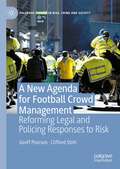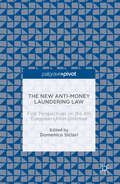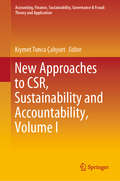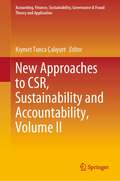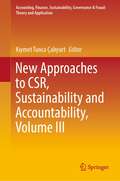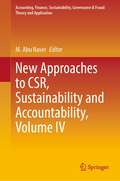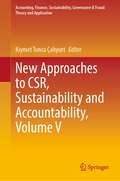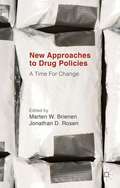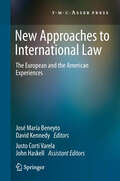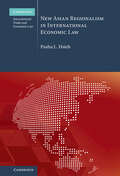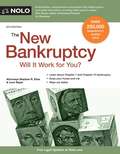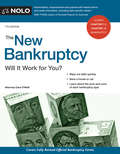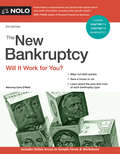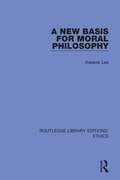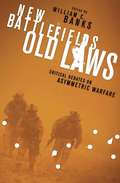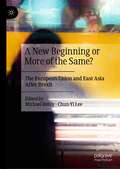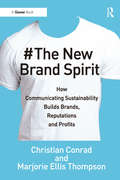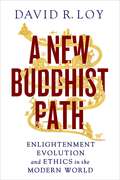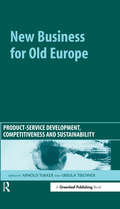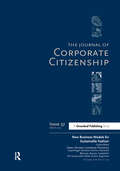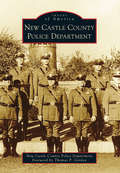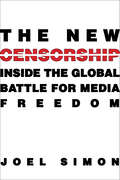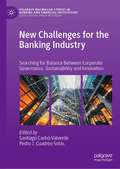- Table View
- List View
A New Agenda For Football Crowd Management: Reforming Legal and Policing Responses to Risk (Palgrave Studies in Risk, Crime and Society)
by Geoff Pearson Clifford StottThis book provides a holistic and interdisciplinary focus on the legal regulation and policing of football violence and disorder in Britain. Anchored in ground-breaking ethnographic and participant-action research, the book combines a crowd psychology and socio-legal approach to critically explore the contemporary challenges of managing football crowds. It sets out the processes by which football disorder occurs and the limitations of existing approaches to policing ‘football hooliganism’, in particular the dominant focus on controlling ‘risk supporters’, before setting out proposals for fundamental reforms to both law and policing. This book will be of value to academics, students, legal and policing practitioners, as well as policy-makers. The two authors are internationally known experts in the management and behaviour of football crowds and bring together for the first time over 30 years of research in this area from the disciplines of law and social psychology.
The New Anti-Money Laundering Law
by Domenico SiclariThis book introduces andcontextualizes the revised and strengthened legislation on the laundering ofcriminal funds mandated by the European Union on the 20th May 2015. The authors provide fresh and new insight into the EU's fourth directive2015/849, with a specific focus on topics such as: beneficial ownership andeffective transparency, the risk-based approach, the issue of supervision ofpayment institutions that operate across borders by agents, the new method ofrisk assessment, tax crimes inclusion in "criminal activity" definition, andthe effects of new rules on the gambling sector. The authors present the newlaws in the context of their legal genealogy and demonstrate the benefits theybring in raising the standards for anti-money laundering regulation andcounter-terrorism financing. The book's comprehensiveexploration of this new legislation will appeal to policy-makers, students andacademics hoping to understand the changes more clearly.
New Approaches to CSR, Sustainability and Accountability, Volume I (Accounting, Finance, Sustainability, Governance & Fraud: Theory and Application)
by Kıymet Tunca ÇalıyurtThis book provides a platform for discussing the challenges that organizations face in order to implement sustainability, ethics, and effective corporate governance, all of which are important elements of “standing out” from other companies. Examining the background of the New European Consensus on development with the new guiding motto ‘Our World, Our Dignity, Our Future’, the authors explore how this new legislation on sustainability issues around the world is forcing companies to deal directly with sustainability issues. The 2030 Agenda for Sustainable Development (2030 Agenda), adopted by the United Nations in September 2015, is the international community’s response to global challenges and trends in connection with sustainable development. With the Sustainable Development Goals (SDGs) at its core, the 2030 Agenda is a transformative political framework designed to eradicate poverty and achieve sustainable development globally. It balances the economic, social and environmental dimensions of sustainable development, including the key issues of governance and peaceful and inclusive societies, and recognizes the essential interlinkages between its goals and targets, i.e., that they must be implemented as a whole and not selectively. The respective chapters in this volume raise a number of questions regarding companies’ ability to implement sustainability, ethics, and effective corporate governance. Simultaneously, they explore how organizations must adapt to sustainability-related developments.
New Approaches to CSR, Sustainability and Accountability, Volume II (Accounting, Finance, Sustainability, Governance & Fraud: Theory and Application)
by Kıymet Tunca ÇalıyurtThis book continues the discussion on the challenges that organizations face in order to implement sustainability, ethics, and effective corporate governance, all of which are important elements of “standing out” from other companies. Examining the background of the New European Consensus on development with the new guiding motto ‘Our World, Our Dignity, Our Future,’ the authors explore how this new legislation on sustainability issues around the world is forcing companies to deal directly with sustainability issues.The 2030 Agenda for Sustainable Development (2030 Agenda), adopted by the United Nations in September 2015, is the international community’s response to global challenges and trends in connection with sustainable development. With the Sustainable Development Goals (SDGs) at its core, the 2030 Agenda is a transformative political framework designed to eradicate poverty and achieve sustainable development globally. It balances the economic, social, and environmental dimensions of sustainable development, including the key issues of governance and peaceful and inclusive societies, and recognizes the essential interlinkages between its goals and targets, i.e., that they must be implemented as a whole and not selectively. The respective chapters in this volume raise a number of questions regarding corporate social responsibility, ethics, and corporate governance in the face of new technology, and new approaches to climate change and sustainability reporting.
New Approaches to CSR, Sustainability and Accountability, Volume III (Accounting, Finance, Sustainability, Governance & Fraud: Theory and Application)
by Kıymet Tunca ÇalıyurtThis book continues the discussion in the first two volumes on the challenges that organizations face in order to implement sustainability, ethics, and effective corporate governance, all of which are important elements of “standing out” from other companies. Examining the background of the New European Consensus on development with the new guiding motto ‘Our World, Our Dignity, Our Future,’ the authors explore how this new legislation on sustainability issues around the world is forcing companies to deal directly with sustainability issues.The 2030 Agenda for Sustainable Development (2030 Agenda), adopted by the United Nations in September 2015, is the international community’s response to global challenges and trends in connection with sustainable development. With the Sustainable Development Goals (SDGs) at its core, the 2030 Agenda is a transformative political framework designed to eradicate poverty and achieve sustainable development globally. It balances the economic, social, and environmental dimensions of sustainable development, including the key issues of governance and peaceful and inclusive societies, and recognizes the essential interlinkages between its goals and targets, i.e., that they must be implemented as a whole and not selectively. The respective chapters in this volume raise a number of questions regarding corporate social responsibility, ethics, and corporate governance in the face of new technology, and new approaches to climate change and sustainability reporting.
New Approaches to CSR, Sustainability and Accountability, Volume IV (Accounting, Finance, Sustainability, Governance & Fraud: Theory and Application)
by M. Abu NaserThis book continues the discussion on the challenges that organizations face in order to implement sustainability, ethics, and effective corporate governance, all of which are important elements of “standing out” from other companies. Examining the background of the New European Consensus on development with the new guiding motto ‘Our World, Our Dignity, Our Future,’ the authors explore how this new legislation on sustainability issues around the world is forcing companies to deal directly with sustainability issues.The 2030 Agenda for Sustainable Development (2030 Agenda), adopted by the United Nations in September 2015, is the international community’s response to global challenges and trends in connection with sustainable development. With the Sustainable Development Goals (SDGs) at its core, the 2030 Agenda is a transformative political framework designed to eradicate poverty and achieve sustainable development globally. It balances the economic, social, and environmental dimensions of sustainable development, including the key issues of governance and peaceful and inclusive societies, and recognizes the essential interlinkages between its goals and targets, i.e., that they must be implemented as a whole and not selectively. The respective chapters in this volume raise a number of questions regarding corporate social responsibility, ethics, and corporate governance in the face of new technology, and new approaches to climate change and sustainability reporting.
New Approaches to CSR, Sustainability and Accountability, Volume V (Accounting, Finance, Sustainability, Governance & Fraud: Theory and Application)
by Kıymet Tunca ÇalıyurtThis book continues the discussion from the first four volumes on the challenges that organizations face in order to implement sustainability, ethics, and effective corporate governance, all of which are important elements of “standing out” from other companies. Examining the background of the New European Consensus on development with the new guiding motto ‘Our World, Our Dignity, Our Future,’ the authors explore how this new legislation on sustainability issues around the world is forcing companies to deal directly with sustainability issues. The 2030 Agenda for Sustainable Development (2030 Agenda), adopted by the United Nations in September 2015, is the international community’s response to global challenges and trends in connection with sustainable development. With the Sustainable Development Goals (SDGs) at its core, the 2030 Agenda is a transformative political framework designed to eradicate poverty and achieve sustainable development globally. It balances the economic, social, and environmental dimensions of sustainable development, including the key issues of governance and peaceful and inclusive societies, and recognizes the essential interlinkages between its goals and targets, i.e., that they must be implemented as a whole and not selectively. The respective chapters in this volume raise a number of questions regarding corporate social responsibility, ethics, and corporate governance in the face of new technology and new approaches to climate change and sustainability reporting.
New Approaches to Drug Policies: A Time for Change
by Marten W. Brienen Jonathan D. RosenThe U. S. -led war on drugs has failed: drugs remain purer, cheaper and more readily available than when the war on drugs began in 1971. The drug war also has resulted in extreme levels of violence as drug traffickers and organized criminals compete for control of territory. Prohibitionist policies have destroyed the lives of millions of people as prisons warehouse drug offenders. This important volume represents an effort to map new approaches to drug policies. The contributors write from various disciplinary backgrounds and provide crucial insights on a wide-range of topics, including the gang-drug nexus, delinquency, legalization, trafficking, decriminalization, intervention programs and prison reform. This volume also provides a number of policy solutions and alternatives to the current drug strategies. Includes contributions from: Marten W. Brienen, Ted Galen Carpenter, Roger G. Dunham, Gregory Fulkerson, Betty Horwitz, Caitlin Elizabeth Hughes, Hanna Samir Kassab, Ana Maria Lobos, Bradford R. McGuinn, Fida Mohammad, Keri O'Neal, J. Bryan Page, Susan A. Phillips, Vanessa Rayan, Jonathan D. Rosen, Alex Stevens, Steven L. West, and Marcelo Rocha e Silva Zorovich.
New Approaches to International Law
by David Kennedy John Haskell José María Beneyto Justo Corti VarelaThis volume offers a unique reflection on the historic and contemporary influence of the New Approaches to International Law (NAIL) movement within the context of Europe and America. In particular, the contributions focus on the intellectual product of NAIL's founder, David Kennedy, in relation to three legal streams: human rights, legal history, and the law of war. On the one hand, the volume is valuable reading for a broad audience interested in the current challenges facing global governance, and how critical studies might contribute to innovative intellectual and practice-oriented developments in international law. On the other hand, stemming from a 2010 seminar in Madrid that brought together scholars to discuss David Kennedy's scholarship over the last three decades, the contributions here are a testament to the community and ideas of the NAIL tradition. The volume includes scholars from a wide field of legal interests and backgrounds.
New Asian Regionalism in International Economic Law (Cambridge International Trade and Economic Law)
by Pasha L. HsiehThis book provides the first systematic analysis of new Asian regionalism as a paradigm shift in international economic law. It argues that new Asian regionalism has emerged amid the Third Regionalism and contributed to the New Regional Economic Order, which reinvigorates the role of developing countries in shaping international trade norms. To substantiate the claims, the book introduces theoretical debates and evaluates major regional economic initiatives and institutions, including the ASEAN+6 framework, APEC, the CPTPP and the RCEP. It also sheds light on legal issues involving the US-China trade war and the COVID-19 pandemic, as well as trade policies of Asian powers, the European Union and the United States. Hence, the legal analysis and case studies offer a fresh perspective of Asian integration and bridge the gap between academia and practice.
New Bankruptcy,The
by Stephen Elias Leon BayerConsidering bankruptcy? Get the facts and find out how bankruptcy could work for you. Bankruptcy laws have changed, and figuring out how to use them effectively is harder than ever. For plain-English guidance you can trust, turn to The New Bankruptcy. Get the strategies, clear-cut answers, and information and you need to figure out whether bankruptcy is the right solution for your debt problems. Find out: -if you qualify for Chapter 7 bankruptcy -how Chapter 13 repayment plans work -which debts are wiped out -how bankruptcy affects homeowners -if you can keep cars and other property -how bankruptcy affects credit -alternative ways to handle debt problems This edition includes updated state and federal exemption tables, plus information on recent Supreme Court cases used to interpret 2005 bankruptcy changes. You'll also get worksheets to help you determine whether you can file for bankruptcy, including fully up-to-date exemption charts, helpful checklists, and easy-to-use legal charts for all 50 states.
New Bankruptcy, The: Will It Work for You?
by Stephen Elias Leon BayerChoose the best bankruptcy option The New Bankruptcy provides clear-cut information, answers to common questions, worksheets, and strategies to help you figure out whether bankruptcy is the right solution to your debt problem. Find out: the main differences between Chapter 7 and Chapter 13 bankruptcy whether you qualify for Chapter 7 bankruptcy (the means test) how the Chapter 13 repayment plan works which type of bankruptcy (7 or 13) is better in various situations which debts are wiped out what happens to your property, including your home, car, and retirement accounts, and other ways to handle debt problems. The book also outlines the bankruptcy process and includes completed sample bankruptcy forms.
New Bankruptcy, The: Will It Work for You?
by Cara O'NeillNot sure where to start? Let’s find the right bankruptcy option for you. You know bankruptcy will help you get back on your financial feet. But which chapter type is best? The New Bankruptcy explains the benefits of Chapter 7 and Chapter 13 bankruptcy. You’ll learn that Chapter 7 bankruptcy will: Not sure where to start? Let’s find the right bankruptcy option for you. wipe out credit card balances, utility bills, and more protect property you need to work and live, and take about four to six months to complete. Chapter 13 bankruptcy works by keeping creditors at bay while you: catch up on a house or car payment pay off an overdue tax or support balance, and pay less on other debt, such as credit cards and student loans. The 8th edition’s expanded online companion page includes downloadable worksheets and easy-to-use charts, as well as a sample bankruptcy filing on the latest official legal forms.
A New Basis for Moral Philosophy
by Keekok LeeOriginally published in 1985, this book establishes that moral discourse is critical, rational and objective and challenges the ideology of value irrationalism behind contemporary liberalism. The book discusses the origins of the fact/value distinction, and calls into question the thesis that logical derivability or strict implication is the only legitimate relationship between propositions. A straightforward philosophical treatment of the subject, in the analytical tradition, it will be especially useful for undergraduate students.
New Battlefields/Old Laws: Critical Debates on Asymmetric Warfare (Columbia Studies in Terrorism and Irregular Warfare)
by William BanksAn internationally-recognized authority on constitutional law, national security law, and counterterrorism, William C. Banks believes changing patterns of global conflict are forcing a reexamination of the traditional laws of war. The Hague Rules, the customary laws of war, and the post-1949 law of armed conflict no longer account for nonstate groups waging prolonged campaigns of terrorism—or even more conventional insurgent attacks. Recognizing that many of today's conflicts are low-intensity, asymmetrical wars fought between disparate military forces, Banks's collection analyzes nonstate armed groups and irregular forces (such as terrorist and insurgent groups, paramilitaries, child soldiers, civilians participating in hostilities, and private military firms) and their challenge to international humanitarian law. Both he and his contributors believe gaps in the laws of war leave modern battlefields largely unregulated, and they fear state parties suffer without guidelines for responding to terrorists and their asymmetrical tactics, such as the targeting of civilians. These gaps also embolden weaker, nonstate combatants to exploit forbidden strategies and violate the laws of war. Attuned to the contested nature of post-9/11 security and policy, this collection juxtaposes diverse perspectives on existing laws and their application in contemporary conflict. It sets forth a legal definition of new wars, describes the status of new actors, charts the evolution of the twenty-first-century battlefield, and balances humanitarian priorities with military necessity. While the contributors contest each other, they ultimately reestablish the legitimacy of a long-standing legal corpus, and they rehumanize an environment in which the most vulnerable targets, civilian populations, are themselves becoming weapons against conventional power.
A New Beginning or More of the Same?: The European Union and East Asia After Brexit
by Michael Reilly Chun-Yi LeeThe EU’s interest in and engagement with North East Asia has grown massively over the last three decades, the shaping and implementation of its policy influenced heavily by the UK and its historical links with East Asia. Brexit therefore raises questions about the future of this engagement and comes against a background of wider threats to the liberal world order, especially rising tensions between the USA and China. Worried that they may be forced to choose sides in their hitherto carefully managed relationships with the two, China’s neighbours are therefore watching with interest to see how the EU and the UK respond and manage their future relations with the region. This book goes beyond the traditional trade links to consider diplomatic and security perspectives, as well as wider issues such as the possible impact on educational and research links. It will be of interest to diplomats, scholars, and economists.
The New Brand Spirit: How Communicating Sustainability Builds Brands, Reputations and Profits
by Christian Conrad Marjorie Ellis ThompsonEffective sustainability communication can deliver business value. Get it wrong, however, and the reputational damage will be costly. Stakeholders, and the general public as well as activists, are unforgiving of companies whose products, services, business practices or culture fall short of their socially responsible rhetoric. Based on close to one hundred in-depth interviews with leading experts, Christian Conrad and Marjorie Thompson's The New Brand Spirit helps corporate communications and marketing professionals tackle this conundrum by providing a first-hand view of eight distinct and relevant stakeholder perspectives. Nineteen comprehensive and well-researched best practice cases from sustainability leaders like IBM, Unilever, Marks & Spencer and Puma will inspire all those tasked with communicating sustainability with practical and applicable tools and lessons learned. The result is a book that will enable senior executives, corporate communication professionals and brand managers to decide when, to whom and how to communicate sustainability related messages - and when not to.
A New Buddhist Path
by David R. LoyEngage with a new vision of Buddhism and the modern world with the bestselling author of Money Sex War Karma: Notes for a Buddhist Revolution.David R. Loy addresses head-on the most pressing issues of Buddhist philosophy in our time. What is the meaning of enlightenment--is it an escape from the world, or is it a form of psychological healing? How can one reconcile modern scientific theory with ancient religious teachings? What is our role in the universe? Loy shows us that neither Buddhism nor secular society by itself is sufficient to answer these questions. Instead, he investigates the unexpected intersections of the two. Through this exchange, he uncovers a new Buddhist way, one that is faithful to the important traditions of Buddhism but compatible with modernity. This way, we can see the world as it is truly is, realize our indivisibility from it, and learn that the world's problems are our problems. This is a new path for a new world.
A New Buddhist Path: Enlightenment, Evolution, and Ethics in the Modern World
by David R. LoyEngage with a new vision of Buddhism and the modern world with the bestselling author of Money Sex War Karma: Notes for a Buddhist Revolution.David R. Loy addresses head-on the most pressing issues of Buddhist philosophy in our time. What is the meaning of enlightenment--is it an escape from the world, or is it a form of psychological healing? How can one reconcile modern scientific theory with ancient religious teachings? What is our role in the universe? Loy shows us that neither Buddhism nor secular society by itself is sufficient to answer these questions. Instead, he investigates the unexpected intersections of the two. Through this exchange, he uncovers a new Buddhist way, one that is faithful to the important traditions of Buddhism but compatible with modernity. This way, we can see the world as it is truly is, realize our indivisibility from it, and learn that the world's problems are our problems. This is a new path for a new world.
New Business for Old Europe: Product-Service Development, Competitiveness and Sustainability
by Ursula Tischner Arnold TukkerSelling products used to be the standard way of doing business. Traditionally, it is left to the user to transform the purchase of a product into something that fulfils effectively a final-user need. Today, two streams of research – business management and sustainability – normally with very distinct perspectives on the world, have surprisingly converged to form a common conclusion: selling products is old-fashioned business. Companies should switch their focus to selling need fulfilment, satisfaction, or experiences. Or, in other words, selling integrated solutions or product-services. The business management literature argues that, by focusing on the integrated, final-client needs, and delivering integrated solutions fulfilling these needs, companies will be able to improve their position in the value chain, enhance added value of their offering, and improve their innovation potential. In a business world where many products are becoming equally well-performing commodities, this strategy is one of the ways to avoid a sheer competition on price – a type of competition that Europe never can win with emerging and low-cost economies such as China. In that sense, product-services can mean new business for old Europe. The sustainability knowledge stream argues that need-focused solutions could be inherently more sustainable than products. Product-services could offer the value of use instead of the product itself and decrease the environmental load in two ways. First, companies offering the service would have all the incentives to make the (product-)system efficient, as they get paid by the result. Second, consumers would be encouraged to alter their behaviour as they gain insight into all the costs involved with the use. Until today, the connections and interchange between the two research streams have been quite limited. The question of whether product-services truly are the avenue to a sustainable world is still under discussion. This book aims to develop a systematic view on this issue. The potential of product-services to enhance competitiveness and contribute to sustainable development prompted the EU to invest heavily in the theme under the EU's 5th Framework Programme (FP5; 1997-2002). A variety of research and development projects in the field were supported under the umbrella of the Sustainable Product Development Network (SusProNet). These included MEPSS (Methodology Product Service Systems); Home Services; HiCS (Highly Customerised Solutions); Prosecco (Product-Service Co-design); and Innopse (Innovation Studio and exemplary developments for Product-Service). The projects were undertaken by a mix of European research institutions and companies including Orange, Philips and Nokia. Some of these projects focused on developing methods that could help industries change their output from a product to a service. Others focused on the development of new product-services or solutions (HiCS, Prosecco, Innopse), and yet others tried to analyze under which circumstances product-services are likely to be implemented and accepted by consumers (Home Services). One project focused on dissemination of the concept to SMEs (Lean Services). Other projects focused purely on new product-service development, such as Brainfridge (an intelligent fridge managing its supply chain), ASP-NET (application service providers), Protex (intelligent enzymes) and IPSCON (receivers for wireless telephones). New Business for Old Europe brings together the key outputs from all of these groups to present a state-of-the-art collection on product-service development, prospects and implications for competitiveness and sustainability. The book has a number of aims. First, it attempts to bridge the gap between business and sustainability literature to lead to a better-founded understanding of the business drivers for embarking on product-service development, and its relation with sustainability and competitiveness. Second, the book reviews the large amount of studies that h
New Business Models for Sustainable Fashion: A Special Theme Issue of The Journal of Corporate Citizenship (Issue 57)
by Esben Rahbek Gjerdrum Pedersen Miguel Angel GardettiThe fashion industry has not traditionally been associated with definitions of sustainable development and sustainability. The social and environmental challenges faced by the fashion industry concern the entire supply and demand chain, propped up by a throwaway consumer culture.In response to these sustainability challenges, some fashion companies have developed innovative social and environmental initiatives. While many of these initiatives are sympathetic, resourceful and hold real potential for generating social and environmental improvements, greater scale and scope is needed in order to bring about a more fundamental shift in current practices.This Special Issue of the Journal of Corporate Citizenship explores how sustainability can be a driver for exploring new business models within a single industrial setting, highlighting some of the sustainability initiatives that bring hope for a more sustainable future. New Business Models for Sustainable Fashion is a must-read for researchers and practitioners tackling the challenges of an industry in need of large-scale transformation.
New Castle County Police Department (Images of America)
by New Castle County Police Department Thomas P. GordonThe New Castle County Police Department has provided over a century of service to a county that continues to grow. In February 1913, two men were duly appointed and became the driving force of the New Castle County Rural Police. By the early 1930s, this small team evolved into an efficient police force. Today, the department has grown to be one of the top law enforcement agencies in the country and is comprised of approximately 350 law enforcement officers. Members of the New Castle County Police Department have displayed tremendous courage and sacrifice in the line of duty. The dedicated men and women of the force continue to provide a positive and invaluable service to the diverse communities of New Castle County.
The New Censorship: Inside the Global Battle for Media Freedom (Columbia Journalism Review Books)
by Joel SimonJournalists are being imprisoned and killed in record numbers. Online surveillance is annihilating privacy, and the Internet can be brought under government control at any time. Joel Simon, the executive director of the Committee to Protect Journalists, warns that we can no longer assume that our global information ecosystem is stable, protected, and robust. Journalists are increasingly vulnerable to attack by authoritarian governments, militants, criminals, and terrorists, who all seek to use technology, political pressure, and violence to set the global information agenda.Reporting from Pakistan, Russia, Turkey, Egypt, and Mexico, among other hotspots, Simon finds journalists under threat from all sides. The result is a growing crisis in information—a shortage of the news we need to make sense of our globalized world and fight human rights abuses, manage conflict, and promote accountability. Drawing on his experience defending journalists on the front lines, he calls on "global citizens," U.S. policy makers, international law advocates, and human rights groups to create a global freedom-of-expression agenda tied to trade, climate, and other major negotiations. He proposes ten key priorities, including combating the murder of journalists, ending censorship, and developing a global free-expression charter to challenge the criminal and corrupt forces that seek to manipulate the world's news.
The New Censorship: Inside the Global Battle for Media Freedom (Columbia Journalism Review)
by Joel SimonAn examination of how the media is under fire and how to safeguard journalists and the information they seek to share with the public.Journalists are being imprisoned and killed in record numbers. Online surveillance is annihilating privacy, and the Internet can be brought under government control at any time. Joel Simon, the executive director of the Committee to Protect Journalists, warns that we can no longer assume that our global information ecosystem is stable, protected, and robust. Journalists are increasingly vulnerable to attack by authoritarian governments, militants, criminals, and terrorists, who all seek to use technology, political pressure, and violence to set the global information agenda.Reporting from Pakistan, Russia, Turkey, Egypt, and Mexico, among other hotspots, Simon finds journalists under threat from all sides. The result is a growing crisis in information—a shortage of the news we need to make sense of our globalized world and fight human rights abuses, manage conflict, and promote accountability. Drawing on his experience defending journalists on the front lines, he calls on &“global citizens,&” U.S. policy makers, international law advocates, and human rights groups to create a global freedom-of-expression agenda tied to trade, climate, and other major negotiations. He proposes ten key priorities, including combating the murder of journalists, ending censorship, and developing a global free-expression charter to challenge the criminal and corrupt forces that seek to manipulate the world's news.&“Wise and insightful. [Simon] offers hope to all who care about maintaining the free flow of information in a world full of would-be censors.&”—Ann Cooper, Columbia Journalism School
New Challenges for the Banking Industry: Searching for Balance Between Corporate Governance, Sustainability and Innovation (Palgrave Macmillan Studies in Banking and Financial Institutions)
by Santiago Carbó-Valverde Pedro J. Cuadros-SolasThis book aims to enrich the banking and finance literature by gathering insights in new research topics being undertaken in the aftermath of the Covid-19 pandemic. The book spans all the major research fields in finance and banking with a particular focus on corporate governance, sustainability and innovation. The book brings together academics at a range of European universities and stems from research presented at the 2022 Annual Conference of the Wolpertinger Club. The first part focuses on the impact of banks’ corporate governance practice on their performance, including pay gaps as well as diversity and ESG policies. The second part examines how banks are conducting their green transition with topics including reputational risk, greenwashing, green bonds, and ESG scores. The final section of the book considers the role of digitalization and innovative technologies in creating unprecedented disruption in the banking sector. This edited collection is valuable to those researching in finance, banking and business, as well as policymakers and operational decision makers at financial institutions.
